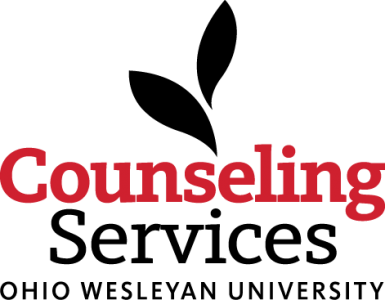Counseling Services at Ohio Wesleyan University (OWU) has experienced an abnormal increase in students seeking help this semester.
Counseling Services provides students with professional and confidential support in times of crisis, challenges or transitions. The staff offers individual, group or couples counseling, consultation, crisis intervention, outreach programming and a variety of other wellness services, according to OWU’s website.
Dr. Doug Bennett, director of Counseling Services, says the number of OWU students who have sought help this semester is atypical. Assistant Director Dr. Julie Duhigg, agrees.
“There is always an increase of requests for help over the progression of a given semester, but this year is standing out in that the requests soared much earlier than usual” Duhigg said.
After running some numbers, Counseling Services recognized a 60 percent increase in students looking for services from this time last year.
“We are struggling to meet the requests for students wanting/needing to be seen. This is unfortunate, and we are working hard to find a way to meet the student body demand for mental health support,” Duhigg said
Students have had to wait around three weeks to get an appointment.
Bennett pointed to a number of causes for this change on OWU’s campus specifically.
“I think this is the new [norm] for us,” Bennett said. “Contributors to that here at OWU have been that we have made a concerted effort to advertise our services quite a bit.”
In addition to the awareness that resulted from such advertising, the creation of the Survivors of Crime Assistance Program (SOCAP) has brought in more students than Counseling Services has seen, Bennett said.
SOCAP, run by counselor Mary DeCenzo, was created through a grant from the office of the Ohio attorney general.“Emphasis of the program is working with survivors of crime,” Bennett said. “At a college campus, what that translates to mostly in regard to her work are individuals who have experienced some type of sexual assault.”
In 2017 there were seven cases of sexual assault on OWU’s campus and in 2016 there were 10, according to OWU’s annual Clery Report.
SOCAP provides OWU students who may have been victims of sexual assault with an appropriate resource that supplies emotional and legal support.
Despite factors specific to OWU, Bennett and Duhigg recognized that this unusual increase in numbers has been a nationwide phenomenon.
“I will add that I am part of a nationwide listserv that provides collegial support to clinical directors of college counseling centers and the majority of other colleges in the U.S. [large and small, public and private] are also commenting on the unprecedented increase in numbers of students in need on their campuses,” Duhigg said.
Bennett identified similar discoveries after attending a conference for counseling directors in New Orleans, LA.
“Talking with my colleagues, I think nationwide we are noticing that counseling services are being called on in greater amounts than we have ever experienced,” Bennett said.
Both Bennett and Duhigg identified academic stressors, social connections and the political climate as factors that have affected this national increase.
“I think that young folks, college students, are under stresses that they haven’t been historically,” Bennet said. “That includes stressors in regard to performance academically and the role that plays in regard to securing employment in the future.”
The increased use of social media has also led to disconnection and made one-on-one interactions less rich and therefore more stressful, Bennett said.
Bennett and Duhigg agreed that the current political climate has also added stressors to students.
Duhigg noted anti-immigration attitudes, the rebirth of white nationalism, mass shootings, anti-transgender policies, reactions to the #BlackLivesMatter and #MeToo movements, and threat of climate change as having led to a sense of insecurity in this generation of students.
“I further believe the social/political environment that fosters divisiveness in our country is negatively impacting students,” Duhigg said. “This atmosphere can certainly shape a person’s feeling of safety and security and I think we are seeing that impact creeping in and negatively impacting the mental health of many people in this country … Our students are not immune.”
Despite their struggles in meeting the requests of students, the staff at Counseling Services expressed gladness about students seeking help.
“Ultimately, I am happy that students are utilizing our services because we want to lay eyes on folks and make sure that they are getting what they need,” Bennett said.
According to Bennett, in order to accommodate for the increase in students desiring appointments, Counseling Services will be helping current students evaluate their skills and resources to determine whether or not they will need continued counseling next semester.
Bennett suggested that students waiting for an appointment should utilize the office’s wellness services, which include a meditation room and online resources.
“I also encourage students to take a look at our website because we have spent quite a bit of time putting together resources there that students can access,” Bennett said. “They could learn more about our services, but they could also learn about prevention.”
Counseling Services has walk-in crisis intervention hours from 1 p.m. to 1:30 p.m. on weekdays for students that may need immediate help.
